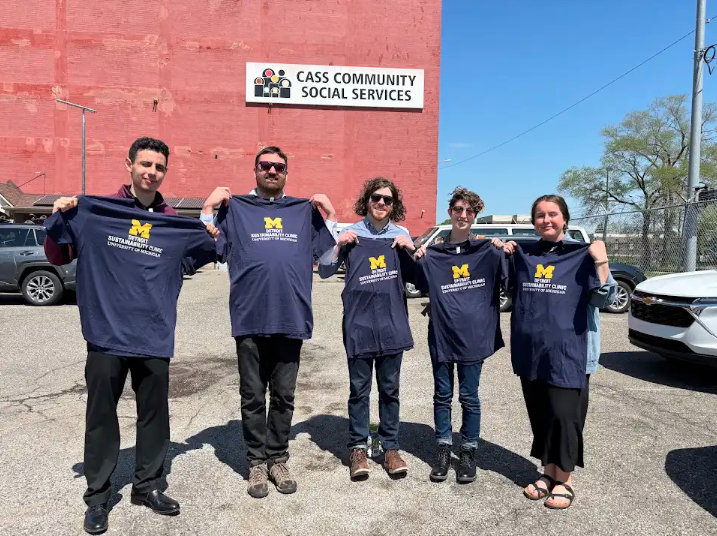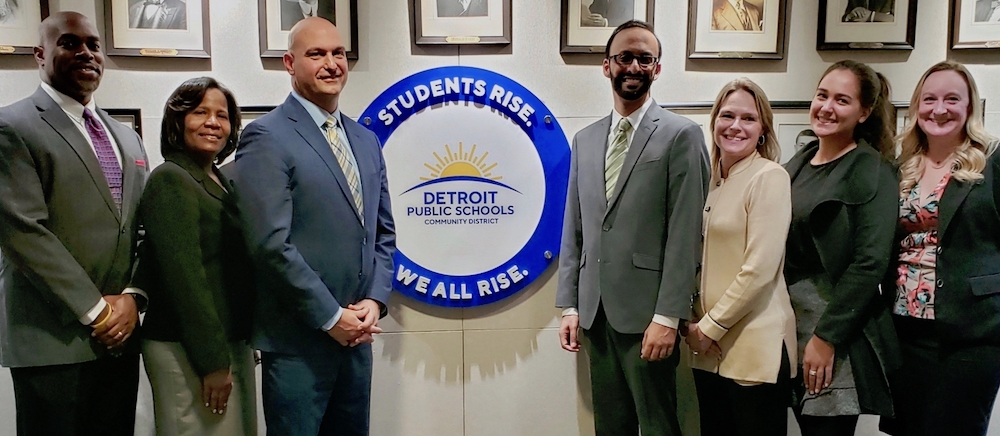Tony Reames Returns to U-M to Lead SEAS Detroit Sustainability Clinic

For two-plus years, Dr. Tony G. Reames was a Biden-Harris Administration presidential appointee, working in energy justice. Most recently he served as the Principal Deputy Director for the Office of State and Community Energy Programs at the U.S. Department of Energy (DOE). Now, he returns to the University of Michigan – where had worked as a research fellow – becoming the Tishman Professor of Environmental Justice and serving as the new Director of the School for Environment and Sustainability (SEAS) Detroit Sustainability Clinic. Through support from the Kresge Foundation, the clinic was founded in 2021 to build long-term capacity and partnership in Detroit, and to connect residents, nonprofit organizations, businesses, and city government to its resources. Reames sat down with SBN Detroit to discuss this new role, the work of the clinic, and how it involves and impacts businesses in Southeast Michigan. Q: What is the impetus behind the clinic? A: The Detroit Sustainability Clinic came into existence based on the recognition that the several faculty in the School for Environment and Sustainability had projects with community-based organizations, government, and business partners in the city that we were approaching in silos. Operating together as a clinic allows us to more cohesively engage with community partners and approach these projects in a more efficient and effective way. Our mission is to be a hub for advancing sustainability and climate action in an equitable and just way. We want to foster long-term relationships with community-based organizations, local governments, and businesses in Detroit to support their sustainability and climate efforts from ideation to implementation. Q: What differentiates the work the clinic does from that of other national or local initiatives in the space? A: We want to be both additive and complementary. Also, what is unique about what we provide is that we can bring the full resources of the university to support sustainability and climate action in communities, centered on equity and justice. We have the opportunity to not only use our research and data but to also boost capacity for community-driven efforts through our students and faculty. Q: How does sustainability feature in the work the clinic does? A: Sustainability for me is recognizing the social, environmental, and economic impacts of the current climate crisis and how we use the research, teaching, and other resources of the University in deep collaboration with our community partners to support a community’s long-term existence. It’s the triple bottom line. We bring these aspects together to help communities with solutions-driven planning and implementation Q: Given the focus on Detroit communities, how does the Detroit Sustainability Action Agenda feature in the work the clinic is doing? A: I participated in planning efforts to develop the city’s Sustainability Action Agenda and Climate Strategy and the Detroit Climate Action Plan. These plans are the foundation for the areas of focus for the clinic. The Detroit Office of Sustainability is a clinic partner, and we have funding to work with the city to implement its climate strategy and Blight to Beauty Initiative. Supporting local sustainability and climate action is the core of what we do. As the clinic expands, I look forward to working with other local governments in Southeast Michigan to create and implement their sustainability and climate action plans. Q: How do you plan to involve and work with businesses in Detroit? A: I’ve been working with folks in Detroit for about ten years and the ingenuity in this city stands out. I’ve spent a good amount of time with entrepreneurs and start-ups that are working on new technology and other ways to help households operate more sustainably. I see the clinic acting as a conduit between businesses that have these technical solutions and communities that need these solutions. As a university, we also have this amazing opportunity to develop the next generation of the sustainability and climate workforce. Q: How do you think that impacts businesses in Southeast Michigan? A: I believe that exposing students to real-world challenges makes them better employees for the business and organizations they’ll go to work for. And I think that students who get involved with businesses and projects in Detroit are more likely to remain in Detroit and continue working here post-graduation. I’ve seen it happen. Once a student is exposed to the issues and opportunities here and has made a professional connection, they are more likely to join the workforce locally versus moving out of state. Q: What is the role of businesses in the community work you do? A: Both residents and businesses make up a community so it’s all interconnected. Businesses support residential neighborhoods and vice-versa, so our approach is place-based, taking into account how the community operates and interacts as a whole. Also, when we think about the growth in different sectors in Southeast Michigan such as landscape architects focused on natural solutions to flooding, engineers working on the next iteration of mobility that eliminates pollution, or those developing a future where all housing is affordable and net zero energy, there is an ecosystem that must connect our greatest challenges to resources and solutions. And that is happening here. Businesses that can tap into this ecosystem and be a part of it will be the most successful businesses going forward. Q: How do you think you can help develop and support this ecosystem in your new role? A: I recently spent 2.5 years at the U.S. Department of Energy focused on designing federal programs with equity and justice at the core, and that’s one of the reasons I’m excited to move forward in this role. We have an unprecedented opportunity to move the needle on this. Businesses now have to focus on equity in order to access much of the current federal and state funding, and they have to meaningfully engage with the community as well. This is an exciting time! We are all starting to speak the same language. I’m optimistic, because I believe the way businesses, communities, and government are now addressing sustainability and
A Social Investment Model Designed to Give Power to Residents and Local Businesses

Rishi Moudgil leads the GreenLight Fund of Detroit, a locally driven, cross-sector, community-centered model to collectively identify critical paths to prosperity and invest in equitable social impact programs for children and families facing economic barriers in Detroit. SBN Detroit spoke to Moudgil about the model, sustainability, and impact on Detroit residents, businesses, and stakeholders. Q: Tell us about GreenLight Fund – what is the impetus behind it? A: We are focused on tackling poverty and its effects on residents by investing in solutions that complement the local landscape and boost the existing ecosystem with a proven model that has had a track record in other urban areas. We believe that for a social impact model to succeed and scale it must be aligned directly with who it serves and therefore local folks must drive the process of both determining their needs and selecting the ventures we invest in. It comes back to the challenge of pushing into a community versus being pulled. Our unique model is pull-through. We organize the stakeholders and local advocates to ensure that only programs that align with their needs and have high quality are brought in. Q: What are examples of programs you’ve invested in and the outcomes? A: A workforce program example is the Center for Employment Opportunities. We launched this in Detroit, and it offers immediate and comprehensive employment options for those who have been incarcerated. It’s a multistage model that helps folks to gain immediate employment and put them on a path for long-term work. This dramatically reduces the human cost and financial costs of returning to the justice system. They also partner with existing organizations to shift policy measures that benefit thousands of residents to stabilize their lives and gain employment. Another workforce program is the New Teacher Center, which provides new instructors with embedded support to enhance teaching practice and retention. This builds sustainability within their jobs and student learning gains in the classroom. The program has trained over 150 veteran teachers who mentor new teachers with evidence-based support and it’s reducing the turnover rate in the Detroit Public Schools community district. These programs each came by a community-led process where local residents helped determine the gaps in their communities. We also then hire Detroiters to run the new programs. Q: Relating it to sustainability and businesses in Southeast Michigan – what role does economic sustainability play in your investment strategy in Detroit? A: The key foundation for people to prosper is a combination of economic stability and to have opportunities to advance. Workforce opportunities are critical, and in a place that has been plagued by disinvestment for so long, workforce and economic programs are not enough. We need to wrap around human services transit, housing, education, and more. There are so many topics related to creating an economic foundation for individuals and businesses. Q: What role does environmental sustainability play? A: We can’t have stable places to live, work and play unless the environment is stable. And low-income neighborhoods are some of the most environmentally unsound areas, so this exacerbates a host of problems that continues the cycle of poverty. But where development occurs, home ownership will follow, and thus begins the process of building a more sustainable community. Q: Your website says, ‘Our deep connection with the community and strategic partnerships help organizations ramp up and start producing direct, meaningful change. This ongoing support enables organizations to thrive over time.’ How does this work? A: What we are doing is shifting an approach of social investing to both trusting residents directly and developing stronger outcomes. We rely on residents to choose their destinies. We raise unrestricted capital from partners around the city and hand the funding decisions back to local stakeholders. Deep and ongoing trust is the key ingredient toward achieving the best outcomes. After we launch, we hold a seat on their board, shepherd additional partners and resources, and help create a path of success. Q: How do you account for ROI in your investments? A: We are completely focused on social ROI, as are all of our social investment recipients. We co-develop social impact metrics with both our communities and organizations before we begin operations so there is a clear set of performance outcomes we all agree on. Each organization has a set of outcomes that we all pull together toward achieving, and we know that if these goals are achieved then we are achieving the goals desired by our stakeholders. Q: What’s the largest hurdle you face? A: The biggest challenge is the people and families that have been in some of our neighborhoods the longest have received a disproportionate brunt of the disinvestment. There is no silver bullet. Multiple efforts need to be tackled over the long term. We have to be honest about how we all got here and have difficult conversations about race and gender and inequality. So, one of the largest hurdles is alignment. Are the solutions properly aligned to the true needs of the people and planet and are they sustainable to create lasting change over time. Q: How do you see the city’s Sustainability Action Agenda aligning with the work you are doing? A: We are completely aligned with the agenda and believe we need integrated action. This means centering people and the planet simultaneously. We can no longer isolate variables and expect progress. Sustainability and social impact goals must be front and center as we build toward the future. Be sure to subscribe to our newsletter for regular updates on sustainable business practices in and around Detroit.


